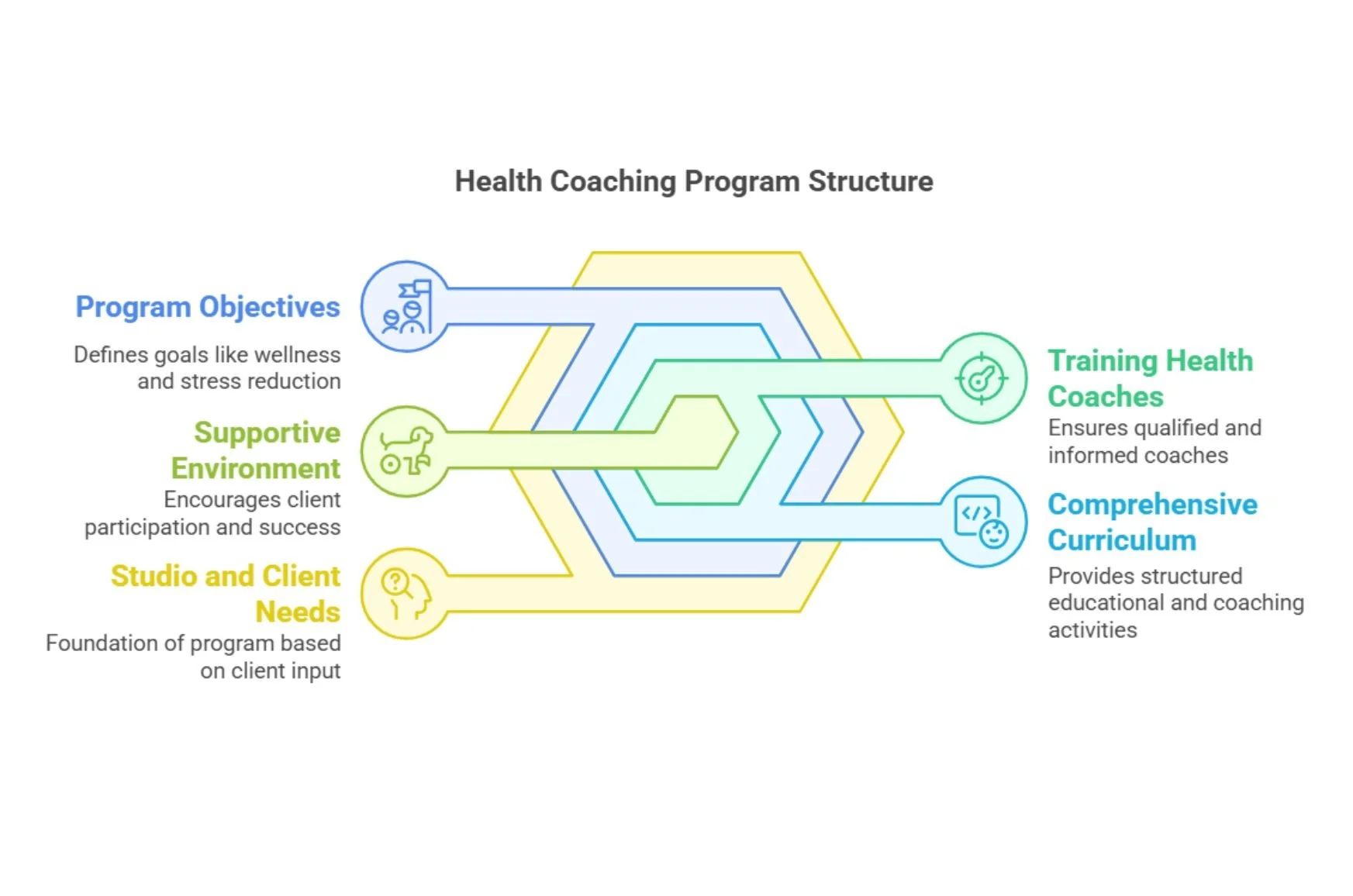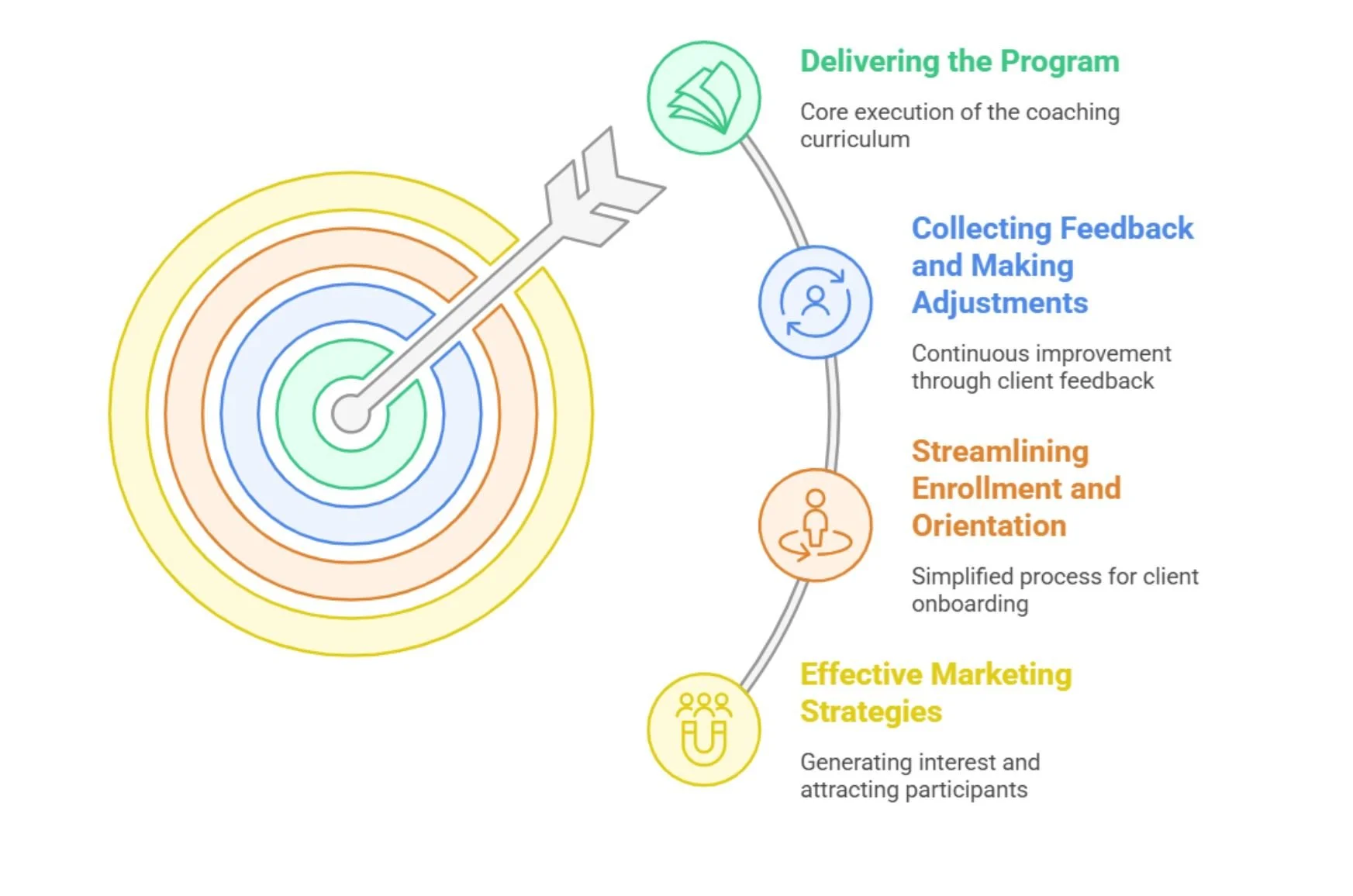Developing Health Coaching Programs for Yoga Studios
In today’s fast-paced world, holistic wellness practices are gaining traction, and yoga studios are evolving into sanctuaries of peace, health, and well-being. To meet the growing demand for comprehensive wellness solutions, many studios are incorporating health coaching programs. These programs not only enhance the client experience but also foster deeper engagement and business growth.
The Synergy Between Yoga and Health Coaching
Yoga and health coaching complement each other seamlessly. While yoga focuses on physical postures, breathing techniques, and meditation to cultivate balance, health coaching provides structured guidance for sustainable lifestyle changes. Integrating both allows clients to achieve a more holistic transformation, addressing both the body and mind.
Benefits of Integrating Health Coaching in Yoga Studios
1. Enhanced Client Experience
Clients today seek more than just a physical workout; they want a holistic wellness experience that nurtures their body, mind, and spirit. By incorporating health coaching, yoga studios can provide personalized health plans tailored to each individual's unique needs, goals, and challenges. These programs often include nutritional guidance, stress management techniques, and lifestyle modifications that complement the physical and meditative aspects of yoga.
Additionally, health coaching offers ongoing support and accountability, ensuring that clients stay motivated and committed to their wellness journey. Whether through one-on-one coaching sessions, group workshops, or digital resources like meal plans and fitness tracking, clients receive comprehensive wellness education that empowers them to take charge of their health. As a result, they experience a more fulfilling and rewarding journey toward their well-being.
2. Increased Client Retention
Building strong relationships with clients is crucial for the long-term success of a yoga studio. Implementing client retention strategies such as offering health coaching alongside yoga classes helps studios create deeper connections with their members by addressing their overall health, not just their physical fitness. This personalized approach fosters trust and loyalty, making clients feel more valued and supported in their wellness goals.
Moreover, health coaching encourages consistent engagement. Unlike traditional yoga memberships, which may see fluctuations in attendance, coaching programs often include scheduled check-ins, goal-setting sessions, and progress tracking, keeping clients actively involved. By integrating client retention strategies like personalized support, progress monitoring, and exclusive wellness programs, studios can enhance overall client satisfaction, leading to higher retention rates and reducing the likelihood of cancellations or drop-offs
3. Expanded Revenue Streams
Diversifying services is essential for the financial sustainability of a yoga studio, and integrating health coaching opens up multiple new revenue streams. Studios can offer:
One-on-one health coaching sessions: Personalized consultations that cater to individual health concerns and goals.
Group wellness programs: Structured programs focusing on nutrition, stress management, and lifestyle changes.
Premium workshops and retreats: Special events that provide immersive wellness experiences, combining yoga, mindfulness, and holistic health education.
Subscription-based wellness memberships: Monthly or quarterly programs that include both yoga classes and ongoing health coaching.
Online coaching programs: Virtual sessions and digital wellness plans that reach a broader audience beyond the local community.
By offering a range of services, yoga studios can attract a wider clientele, increase membership value, and boost overall profitability. This business model also enhances sustainability, as clients who invest in holistic wellness programs are more likely to stay committed for the long term.
4. Holistic Health Outcomes
Yoga is already known for its profound benefits on physical and mental health, but when combined with health coaching, it creates a truly holistic approach to well-being. Clients experience improvements in multiple areas, including:
Physical Health: Health coaching encourages better dietary habits, improved hydration, and personalized fitness recommendations, leading to increased energy levels and enhanced physical performance.
Mental Clarity and Emotional Balance: The combination of mindfulness practices and structured lifestyle coaching helps reduce stress, anxiety, and emotional imbalances, leading to greater mental resilience.
Sustainable Lifestyle Changes: Unlike temporary fitness trends, health coaching focuses on long-term, sustainable habits, helping clients achieve and maintain their health goals over time.
By integrating health coaching into their services, yoga studios can position themselves as comprehensive wellness hubs, offering clients a well-rounded path to long-term health, vitality, and inner peace.
Designing a Health Coaching Program for Yoga Studios
1. Assessing Studio and Client Needs
Understanding the specific needs of clients and the studio is crucial. Conduct surveys, host focus groups, and engage in one-on-one conversations to determine common health challenges and goals.
2. Defining Program Objectives and Scope
Based on the gathered insights, outline clear objectives such as weight management, stress reduction, improved nutrition, or holistic wellness. Clearly define the program structure, services offered, and target audience.
3. Developing a Comprehensive Curriculum
An effective health coaching program should include:
Educational Workshops: Covering topics like mindfulness, stress management, and nutrition.
Personalized Coaching Sessions: Tailored to individual health goals.
Regular Assessments: Monitoring progress and adjusting strategies accordingly.
Resources and Tools: Providing clients with meal plans, exercise routines, and mental wellness techniques.
4. Training and Certifying Health Coaches
Qualified health coaches with proper certifications, strong interpersonal skills, and updated knowledge are key to a successful program. Ongoing training helps them stay informed about the latest health trends.
5. Creating a Supportive Environment
A welcoming and motivating environment encourages clients to actively participate in their wellness journey. Celebrating small victories and providing emotional support can boost engagement and success rates.
Implementing and Marketing the Health Coaching Program
1. Effective Marketing Strategies
Utilize social media, email campaigns, and in-studio promotions to generate interest. Highlight the program’s benefits and share client success stories. Offering free introductory workshops can attract potential participants.
2. Streamlining Enrollment and Orientation
Ensure an easy enrollment process with clear information about fees, schedules, and expectations. Conduct orientation sessions to familiarize clients with the program structure and health coaches.
3. Delivering the Program
Stick to the planned curriculum, conduct regular coaching sessions, and use technology like fitness tracking apps and virtual consultations to enhance engagement.
4. Collecting Feedback and Making Adjustments
Regular feedback from clients helps refine the program. Surveys, direct conversations, and progress tracking ensure continuous improvement and alignment with client needs.
Measuring Program Success
1. Tracking Client Outcomes
Monitor key health improvements such as weight management, stress reduction, and overall well-being.
2. Evaluating Client Satisfaction
Client feedback, testimonials, and retention rates provide insights into the program’s effectiveness.
3. Assessing Participation Rates
High enrollment and active engagement indicate a well-received program.
4. Analyzing Financial Performance
Track revenue, costs, and return on investment to ensure long-term sustainability.
6 Less-Known Facts About Health Coaching in Yoga Studios
Enhanced Mind-Gut Connection: Health coaching often includes nutritional guidance that complements yoga’s impact on gut health, improving digestion and mood.
Increased Neuroplasticity: The combination of mindful movement and personalized coaching enhances brain function, aiding in cognitive flexibility and emotional resilience.
Sleep Quality Boost: Clients enrolled in yoga and health coaching programs often experience deeper sleep due to stress reduction and better lifestyle habits.
Hormonal Balance: The synergy between yoga and personalized wellness plans can regulate hormones, particularly reducing cortisol levels linked to stress.
Community Support Factor: Group coaching within yoga studios fosters a sense of community, increasing motivation and accountability among participants.
Tech Integration for Better Results: More studios are incorporating wearable health trackers and AI-driven coaching apps to personalize client experiences.
Conclusion
Integrating health coach certification programs into yoga studios offers a transformative experience for clients, enhancing their well-being while strengthening client-studio relationships. By carefully designing, implementing, and measuring these programs, studios can position themselves as holistic wellness hubs. With the growing demand for personalized health solutions, now is the perfect time to embrace health coaching and expand the impact of yoga beyond the mat.
For yoga studios looking to integrate health coaching effectively, obtaining a health coach certification is a valuable step. Certified health coaches bring credibility, expertise, and structured methodologies to wellness programs, ensuring clients receive professional guidance tailored to their needs. Accreditation from reputable organizations such as ANHCO provides industry recognition and adherence to high coaching standards. ANHCO supports health coaches through training, certification, and resources that help them offer evidence-based coaching practices.
By incorporating certified health coaches into their programs, yoga studios can enhance client trust, provide science-backed wellness strategies, and establish themselves as leaders in the holistic health and wellness industry.
FAQS
-
A health coaching program for yoga studios combines personalized health advice with yoga practice, helping clients achieve wellness goals such as improved flexibility, stress relief, and overall health.
-
Health coaching enhances the yoga experience by addressing nutrition, fitness, mental health, and lifestyle changes, providing a holistic approach to well-being.
-
The program can include personalized nutrition plans, mindfulness techniques, lifestyle habits, stress management strategies, and guidance on integrating yoga with daily life.
-
Start by assessing the needs of yoga students, combining health coaching techniques with yoga practices, and creating a program that focuses on both physical and mental wellness.
-
Yes, health coaching can support yoga students by improving strength, flexibility, and mental focus, as well as addressing any physical or emotional blocks they may face in their practice.
-
The program duration depends on the goals, but typically ranges from 4 to 12 weeks, with regular check-ins to monitor progress and make adjustments.
-
Yes, you can offer remote coaching via video calls, digital content, and virtual workshops, making it easier for clients to access support from anywhere.
-
Promote your program through the yoga studio's website, social media platforms, newsletters, and in-studio promotions, while highlighting the benefits of combining health coaching with yoga practice.





